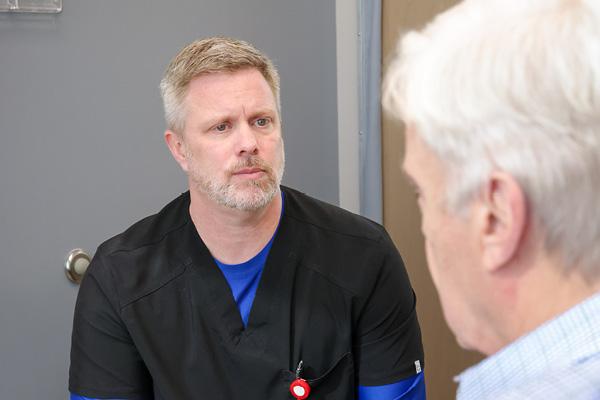HNS&CS Clinicians Advance Their Careers with Additional Degrees

The Duke Department of Head and Neck Surgery & Communication Sciences recognizes that the ability of healthcare team members to deliver compassionate and effective care is directly influenced by their own growth and well-being. This takes a variety of forms related to life-long learning and professional development.
We also celebrate and support clinicians who obtain additional degrees to advance their careers and contribute more meaningfully to patient care. The following team members recently earned additional degrees while practicing medicine:
- Russel R. Kahmke, MD, received a Master of Management in Clinical Informatics from Duke in 2018 and a Master of Business Administration from the University of North Carolina Wilmington in 2023.
- Ralph Abi Hachem, MD, will receive a Master of Business Administration from the University of North Carolina Wilmington in 2024.
- Joshua F. Smith, PA-C, received a Doctor of Medical Science from the University of Lynchburg in 2024.
- Ariel Hayden, PA-C, is pursuing a Master of Business Administration.
- Walter Lee, MD, completed the Master of Health Science in Clinical Leadership program.
Pursuing New Paths Through Education
For clinicians, pursuing an additional degree is often driven by a combination of personal goals, a desire to develop additional knowledge and skill sets, and the desire to improve the quality of patient care.
These HNSC&S members sought to expand their expertise beyond clinical practice, recognizing that additional qualifications could open doors to expanded roles and leadership possibilities — particularly at a time of rapid changes in healthcare.
“Full-time clinical medicine is challenging,” Dr. Kahmke says. “Having an alternate education provides opportunities within and outside of direct patient care.”
Dr. Smith chose to pursue a DMSc degree because his career had started to involve aspects of administrative leadership and management.
“By completing this course of study, I have gained the knowledge and skills that will allow me to continue to pursue hospital leadership opportunities,” he says.
When Dr. Hachem was appointed director of the Duke Skull Base Center in 2020, he was motivated to expand his skill set.
“I wanted to complement my medical expertise with business knowledge to effectively manage the center,” he says. “As I engaged in the coursework, I discovered a deep interest in the material and found practical insights that have helped me manage the center more effectively and become a better healthcare leader.”
Managing Dual Demands
Balancing the demands of a full-time medical career and family life with the rigors of additional education is a significant challenge. The clinicians said the commitment to further education required careful planning and the willingness to make adjustments in both their personal and professional lives.
They emphasized the importance of strong personal and professional support systems.
“The support of my family and my colleagues has been invaluable,” Dr. Hachem says. “I couldn’t have managed this without their encouragement and understanding.”
For Dr. Smith, time management played a crucial role. His mornings would begin at 5 a.m. so he could work on his studies before his day officially started. On the weekends, he would work until noon.
“This gave me time to complete my schoolwork and work full-time at Duke, and it freed up my evenings and weekend afternoons for personal time,” he says.
Lifelong Learning in a Rapidly Evolving Profession and Industry
For these clinicians, obtaining additional degrees provided them with new capabilities that are directly applicable to their roles. It also enabled them to stay current in the rapidly evolving healthcare landscape, ensuring that they can offer the best possible care to their patients and influence evolving healthcare delivery from the front lines.
“Duke empowers physicians to actively lead and participate in administrative and organizational decisions, ensuring that we continue to serve our patients in the most effective way,” Dr. Hachem says. “Continuing education further equips us with the skills and knowledge needed to lead and advocate for the best possible patient outcomes.”
Before embarking on an additional formal education, Dr. Kahmke says, it’s crucial to ensure that pursuing a degree is a deliberate choice that aligns with your personal and professional objectives.
“Spend time learning about yourself, your career goals, and what makes the most sense to get you there,” he says. “Don't just say yes because others want you to.”
Healthcare providers are lifelong learners, a trait that is essential to staying ahead in healthcare. Pursuing a degree can position you to lead in a dynamic field.
“What we learned in school is quickly being replaced with new information,” Dr. Smith says. “By continually learning and bettering yourself, you will have open doors in the future that would otherwise have been closed. You are setting yourself up for future success.”